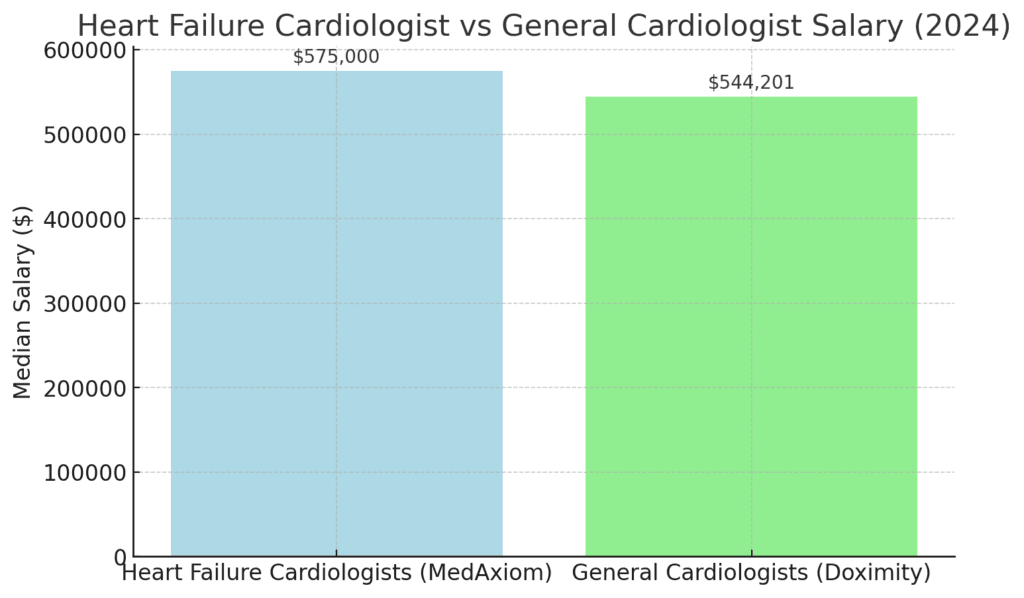Table of Contents
- Introduction
- Overview of a Heart Failure Cardiologist’s Role
- Heart Failure Cardiologist Salary in 2024: Key Data from MedAxiom and Doximity
- Factors Influencing Heart Failure Cardiologist Salaries
- Regional Variations in Heart Failure Cardiologist Salaries
- Work RVUs and Productivity Impact on Compensation
- Conclusion
- FAQs
1. Introduction
Heart failure cardiologists are at the forefront of treating one of the most serious cardiovascular conditions: heart failure. With their expertise in managing complex patient care, these specialists command significant compensation. In this article, we will break down the 2024 salary trends for heart failure cardiologists, using insights from the 2023 MedAxiom Cardiovascular Compensation Report and the 2023 Doximity Physician Compensation Report. These reports reveal not only the earning potential but also the factors driving salaries, such as productivity, geographic location, and practice setting.
2. Overview of a Heart Failure Cardiologist’s Role
A heart failure cardiologist specializes in the diagnosis and management of patients with heart failure. They often treat patients with complex cases, requiring a deep understanding of cardiac function and the latest treatment protocols. These specialists are integral in both clinical settings and advanced treatment programs, such as transplant centers.
Given their expertise, heart failure cardiologists earn competitive salaries. However, their compensation tends to reflect the intensity and complexity of their work, as well as broader market factors such as location and institutional setting.
3. Heart Failure Cardiologist Salary in 2024: Key Data from MedAxiom and Doximity
According to the 2023 MedAxiom Cardiovascular Compensation Report, the median compensation for heart failure cardiologists in 2022 was $575,000. This puts them at the lower end of the cardiology compensation spectrum, with electrophysiologists and interventional cardiologists leading the field. However, despite being slightly lower than other procedural specialties, heart failure cardiologists still command higher salaries than many other medical fields due to the complexity and intensity of their work.

Data from Doximity’s 2023 Physician Compensation Report further supports these findings, noting that cardiology as a specialty saw steady compensation increases, although heart failure specialists’ growth was more modest. The report highlights that cardiologists as a group earned an average of $544,201 annually in 2023, with subspecialists like those in advanced heart failure typically earning more than general cardiologists.
4. Factors Influencing Heart Failure Cardiologist Salaries
Several key factors influence the salaries of heart failure cardiologists:
- Demand for Expertise: Heart failure management is critical, especially as populations age and heart disease becomes more prevalent. This demand drives salaries upward.
- Work Relative Value Units (wRVUs): Heart failure cardiologists rely heavily on evaluation and management (E/M) services, which tend to generate lower wRVUs compared to procedural specialties like interventional cardiology. Despite this, they still generate a significant workload, with advanced heart failure physicians producing around 5,994 wRVUs annually, according to MedAxiom.
- Practice Setting: Cardiologists in integrated systems (hospitals) tend to earn higher compensation than those in private practice. The MedAxiom report shows that heart failure specialists in integrated settings earned $576,498, compared to $460,700 in private practice. This disparity reflects the larger patient volume and institutional support in integrated systems.
5. Regional Variations in Heart Failure Cardiologist Salaries
Regional differences play a significant role in compensation. The MedAxiom 2023 report reveals that the South remains the highest-paying region for heart failure cardiologists, with median salaries surpassing $698,881. In contrast, the Northeast lags behind, with median compensation closer to $548,192.

These differences are often driven by regional demand, the cost of living, and the prevalence of high-volume healthcare institutions. For heart failure cardiologists, working in regions with a high demand for cardiovascular care—particularly in the South—can result in significantly higher compensation.
6. Work RVUs and Productivity Impact on Compensation
Work Relative Value Units (wRVUs) are a key metric for determining physician productivity and compensation. Heart failure cardiologists, while not as procedurally focused as electrophysiologists or interventional cardiologists, still generate substantial wRVUs through complex patient management. However, as the MedAxiom report shows, they typically generate fewer wRVUs compared to other cardiology subspecialties, which impacts their overall compensation.
For instance, electrophysiologists and interventional cardiologists typically produce over 13,000 wRVUs annually, while heart failure cardiologists average around 5,994 wRVUs. Despite this, their compensation per wRVU remains relatively high, indicating that while they may manage fewer patients or procedures, the complexity of their care commands higher rates per unit of work.
7. Conclusion
Heart failure cardiologists remain an essential component of cardiovascular care, with competitive salaries that reflect the complexity and demand of their specialty. Although their compensation tends to be lower than their procedural counterparts, they still enjoy high earnings due to their specialized knowledge and the growing need for heart failure management. Regional differences and practice settings also significantly impact their earnings, with integrated systems and Southern regions offering the most competitive compensation packages.
As healthcare evolves, heart failure specialists are likely to see continued salary growth, especially as the population ages and heart disease becomes more prevalent. The outlook for 2024 suggests that salaries will remain robust, particularly for those in high-demand regions and institutions.
8. FAQs
1. What is the average salary of a heart failure cardiologist in 2024? The median salary for heart failure cardiologists is around $575,000, with variations based on region and practice setting.
2. How do heart failure cardiologist salaries compare to other cardiology subspecialties? Heart failure cardiologists tend to earn slightly less than electrophysiologists and interventional cardiologists, but their compensation is still competitive within the medical field.
3. Does practice setting affect heart failure cardiologist compensation? Yes, heart failure cardiologists in integrated systems typically earn more, with median compensation of around $576,498, compared to $460,700 in private practices.
4. What regions offer the highest salaries for heart failure cardiologists? The South offers the highest salaries, with median compensation over $698,000, while the Northeast tends to have lower compensation.
5. What role do wRVUs play in heart failure cardiologist compensation? While heart failure cardiologists produce fewer wRVUs compared to other cardiology subspecialties, they earn competitive compensation per wRVU due to the complexity of their care.
Other Articles you may enjoy!
Interventional Cardiologist Salary: A Guide for 2024










